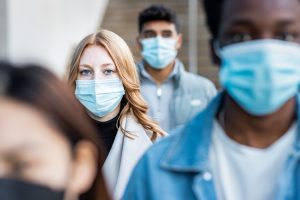 Recently, the Centers for Disease Control and Prevention (CDC) detected a new variant of COVID-19 called BA.2.86. While many details about this variant are not currently known, it is believed (though unconfirmed) that it can potentially cause infections more easily in people who have previously had COVID-19 or have been vaccinated against the virus.
Recently, the Centers for Disease Control and Prevention (CDC) detected a new variant of COVID-19 called BA.2.86. While many details about this variant are not currently known, it is believed (though unconfirmed) that it can potentially cause infections more easily in people who have previously had COVID-19 or have been vaccinated against the virus.
Cases of BA.2.86 were first detected in Denmark and Israel before initially appearing in the United States. The presence of this variant was also preliminarily detected in a wastewater sample collected by the National Wastewater Surveillance System (NWSS), one of multiple monitoring systems used by the CDC to detect COVID-19 variants and better understand their spread throughout the United States.
BA.2.86 has a large number of mutations compared to other variants of COVID-19, raising concerns that it may be more resistant against the immunity provided by vaccines and other treatments. However, it is believed that, based on the mutation profile of this variant, current treatments such as Paxlovid, Veklury, and Lagevrio, as well as the new vaccines to be made available to the public this fall, will still offer effective protection. Additionally, most of the United States population carries COVID-19 antibodies due to prior vaccination, infection, or both, which will likely continue to provide protection against severe illness due to the virus.
BA.2.86 spreads in the same way as other COVID-19 variants, which means that it can generally be prevented in the same ways. Aside from staying up to date with your vaccinations, some steps you can take to protect yourself and others include:
- Washing your hands
- Staying home and getting tested for COVID-19 if you feel sick
- Seeking treatment if you test positive
- Wearing a high-quality mask that fits over your nose and mouth
- Improving ventilation in your home and work space
You can get vaccinated and treated for COVID-19 at Jamaica Hospital Medical Center’s Ambulatory Care Center. To schedule an appointment, please call (718) 206-7001.
All content of this newsletter is intended for general information purposes only and is not intended or implied to be a substitute for professional medical advice, diagnosis or treatment. Please consult a medical professional before adopting any of the suggestions on this page. You must never disregard professional medical advice or delay seeking medical treatment based upon any content of this newsletter. PROMPTLY CONSULT YOUR PHYSICIAN OR CALL 911 IF YOU BELIEVE YOU HAVE A MEDICAL EMERGENCY.
